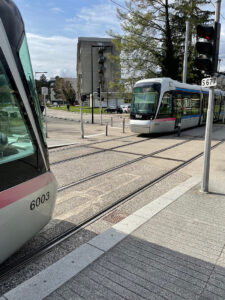
Faster than you think. Literally faster than you remember if you’ve ever taken one. But before we get to that, some figurative and also quite speedy trains.
Like the parade to ban books, or move on from horrifically disgusting violence in schools. These, too, move much faster than we imagine, even as we wait for something or someone else to slow them down or stop them. But it’s a tightly constructed set of deliberate steps that brings the fast trains, whether as transport or societal degradation. In the case of the latter, the stage has been set by the Republican party through decades of vicious stinginess for infrastructure and social programs, proffering the glories of low taxes and toothless regulation of everything from the stock market to the water table. The forms of efficient and affordable transportation enjoyed by people in our so-called peer nations around the world are as unknown in the U.S. as a public toilet and it’s much better if we stop being coy about all of this.
The need to acknowledge where society is falling short, who it is catering to and why is a matter of great urgency.
Image: B line trams in Grenoble, France, last week. Author photo.
